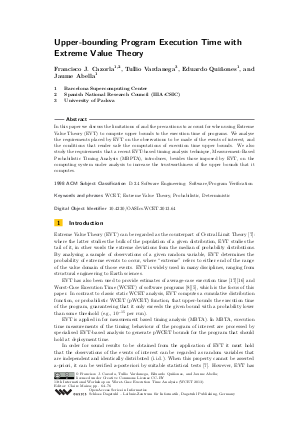Upper-bounding Program Execution Time with Extreme Value Theory
Authors Francisco J. Cazorla, Tullio Vardanega, Eduardo Quiñones, Jaume Abella
-
Part of:
Volume:
13th International Workshop on Worst-Case Execution Time Analysis (WCET 2013)
Part of: Series: Open Access Series in Informatics (OASIcs)
Part of: Conference: Workshop on Worst-Case Execution Time Analysis (WCET) - License:
 Creative Commons Attribution 3.0 Unported license
Creative Commons Attribution 3.0 Unported license
- Publication Date: 2013-07-08
File

PDF
OASIcs.WCET.2013.64.pdf
- Filesize: 0.51 MB
- 13 pages
Document Identifiers
Subject Classification
Keywords
- WCET
- Extreme Value Theory
- Probabilistic
- Deterministic
Metrics
- Access Statistics
-
Total Accesses (updated on a weekly basis)
0PDF Downloads0Metadata Views
Abstract
In this paper we discuss the limitations of and the precautions to account for when using Extreme Value Theory (EVT) to compute upper bounds to the execution time of programs. We analyse the requirements placed by EVT on the observations to be made of the events of interest, and the conditions that render safe the computations of execution time upper bounds. We also study the requirements that a recent EVT-based timing analysis technique, Measurement-Based Probabilistic Timing Analysis (MBPTA), introduces, besides those imposed by EVT, on the computing system under analysis to increase the trustworthiness of the upper bounds that it computes.
Cite As Get BibTex
Francisco J. Cazorla, Tullio Vardanega, Eduardo Quiñones, and Jaume Abella. Upper-bounding Program Execution Time with Extreme Value Theory. In 13th International Workshop on Worst-Case Execution Time Analysis. Open Access Series in Informatics (OASIcs), Volume 30, pp. 64-76, Schloss Dagstuhl – Leibniz-Zentrum für Informatik (2013)
https://doi.org/10.4230/OASIcs.WCET.2013.64
BibTex
@InProceedings{cazorla_et_al:OASIcs.WCET.2013.64,
author = {Cazorla, Francisco J. and Vardanega, Tullio and Qui\~{n}ones, Eduardo and Abella, Jaume},
title = {{Upper-bounding Program Execution Time with Extreme Value Theory}},
booktitle = {13th International Workshop on Worst-Case Execution Time Analysis},
pages = {64--76},
series = {Open Access Series in Informatics (OASIcs)},
ISBN = {978-3-939897-54-5},
ISSN = {2190-6807},
year = {2013},
volume = {30},
editor = {Maiza, Claire},
publisher = {Schloss Dagstuhl -- Leibniz-Zentrum f{\"u}r Informatik},
address = {Dagstuhl, Germany},
URL = {https://drops.dagstuhl.de/entities/document/10.4230/OASIcs.WCET.2013.64},
URN = {urn:nbn:de:0030-drops-41232},
doi = {10.4230/OASIcs.WCET.2013.64},
annote = {Keywords: WCET, Extreme Value Theory, Probabilistic, Deterministic}
}
